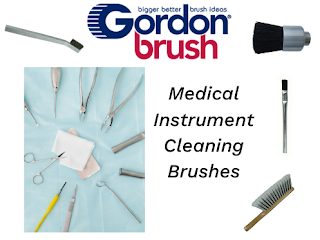Medical instrument cleaning brushes are essential
to prevent cross-contamination and infection. That's why it is imperative to
use the right brush to clean instruments thoroughly. Hospital personnel should
be familiar with the length and gauge of the brush, and which bristle types
should be used on each specific device.
Fill Material
Used for Medical
Instrument Cleaning
- Nylon –Nylon
is the most durable synthetic filament available. It has excellent abrasion and bristle bend recovery. Nylon resists most acids and will not
scratch most surfaces.
- Polypropylene –
Polypropylene is one of the most chemically resistant synthetic materials and is resistant to most acids and bases. Since it does not absorb
moisture, it resists fungi and bacteria, sheds dirt easily, and it's easy
to clean.
- Stainless Steel – Stainless steel is highly resistant to corrosion, heat, and chemicals. It should not be used on insulated or coated instruments because it can damage them. Stainless steel is designed to clean instruments that have serrations or box locks.
Manual
cleaning is recommended for delicate instruments and devices, such as
microsurgical instruments, lensed instruments, power equipment, and other
instruments that cannot tolerate an automated cleaning process. For
these delicate instruments, it is best to use a nylon fill brush first. If
debris still remains on the instrument, then use a stainless steel brush.
Stainless steel brushes are designed to
remove debris, stains, and stubborn bio-burden that the nylon brush cannot
remove. Stainless steel is intended to be used on bone files, needle holders,
burs, hemostats, reamers, scissors, serrated vascular instruments and
orthopedic instruments.
Medical instruments come in many shapes
and sizes, so it is imperative for SPDs (Sterile Processing Departments) to
have a full assortment of brushes specifically designed to clean them properly.
For example, a brush too small for a cannula may result in inadequate cleaning,
since it does not provide the necessary scrubbing action. Conversely, using a
brush that is too large makes the bristles lay against the wall of the lumen.
Even worse, the brush may become stuck inside the channel, ruining both the
device and the brush. The bristle should be able to make
contact with all the walls of the cannula at the same time.
Gordon Brush® manufactures a wide variety
of medical instrument cleaning brushes. These include: medical applicator brushes; medical micro spiral brushes; ring handle medical spiral brushes; thread cleaning brushes; medical toothbrush style brushes; and block brushes; hand scrubbing brushes; vacuum brushes; and other instrument cleaning brushes that are both straight and curved.
If
a brush exists, we have it…If it doesn't, we'll make it!
Call us today or search and shop for medical instrument cleaning brushes now!


This post is really awesome. Genuinely i like this blog. It gives me more useful information. I hope you share lots of things with us .Personalised Keepsakes Brush Set Australia
ReplyDeleteAfter a long time, I read a very beautiful and very important article that I enjoyed reading. I have found that this article has many important points, I sincerely thank the admin of this website for sharing it. Best Medical Weight Scale service provider.
ReplyDeleteGreat blog ! I am impressed with suggestions of author.
ReplyDeleteBuisness Related Articles
Great job for publishing such a nice article. Your article isn’t only useful but it is additionally really informative. Thank you because you have been willing to share information with us.
ReplyDeleteRecent Business Article